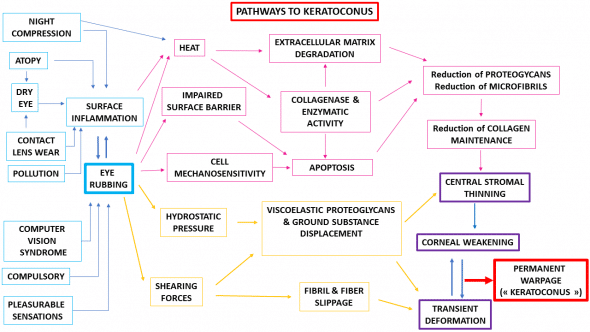Five Surprising Things That Can Trigger Keratoconus

If you have keratoconus, it's important to learn what factors can trigger the condition. These triggers can be anything from allergies to rubbing your eyes too much. In this blog post, we'll discuss five surprising things that can cause keratoconus, how they affect your vision and how to avoid them if you're at risk of developing the condition yourself.
Eye Rubbing
You might think that eye rubbing is a harmless habit, but it can actually cause some serious problems.
For one thing, if you rub your eyes too much or for too long (which is all too easy to do when you're tired or stressed), you can irritate the sensitive skin around your eyes and make them dry out. You may also develop a condition called blepharitis—a bacterial infection of the eyelids that causes redness and irritation. In some cases, chronic eye rubbing can lead to keratoconus—the loss of protein in front of your cornea (the clear front part of your eye) that results in vision loss over time.
If you want to keep from developing keratoconus, take steps now so that you don't have to worry about these symptoms later: stop rubbing your eyes!
Exposure to the Elements
-
UV light. The intensity of UV rays is stronger in places like the desert, and can also be found in other areas of the world that have a high altitude or are very warm.
-
Sunscreens don't protect you from keratoconus. Wear polarized glasses or baseball caps in the sun.
Too Much (or too Little) Nutrition
It's not just what you eat, but how much of it. For example, too little vitamin B2 (riboflavin), which is found in leafy greens and dairy products, can help developing keratoconus. Similarly, too much vitamin C can make your cornea thinner (a big problem if you already have a thin cornea).
The same goes for other nutrients: too little or too much of any substance can be harmful to the eye. The key is finding a balance between what you're eating and drinking now—and also making sure that any supplements or vitamins you take are safe for your eyesight as well.
Unhealthy Habits
Your lifestyle choices and habits can have a big impact on your health. If you’re already living with keratoconus, it’s important to be careful about which activities you participate in, as they may cause further damage to your cornea. Smoking, drinking alcohol and taking drugs, stress (both mental and physical), poor diet, lack of sleep and overexposure to the sun are all things that should be avoided if possible.
If you think one or more of these behaviors is affecting your corneas negatively but aren’t sure how best to stop them from doing so—or if stopping them isn’t going to be enough—it might be time for an eye exam with an optometrist or ophthalmologist who specializes in treating keratoconus patients like yourself. Checking out a list of doctors near you will help to find one who has experience diagnosing their patients' eyesight so that they can prescribe treatment plans accordingly."
Squinting
Squinting is the act of closing one or both eyes to see small print, such as a restaurant menu or a street sign. It can cause eye strain and headaches if done excessively, and certainly can damage your cornea with constant abuse.
Using the Wrong Contact Lens Solution
You’ve probably heard of contact lens solutions, but do you know what they actually do? Contact lens solutions are what keep your lenses moist and clean. This keeps your eyes healthy, which is especially important if you have keratoconus.
There are different types of contact lens solutions: multipurpose, sterile and disinfecting. You can also get a special solution for hard lenses—like scleral lenses, these are made from a different material than soft contacts so they don’t need to be cleaned as often.
You may need to change your solution more often than usual if they were made by an outside manufacturer (e.g., not Bausch & Lomb). If this is the case, ask your optometrist or ophthalmologist how often he or she recommends changing it!
If you have keratoconus, you need to think back to what triggers it.
If you have keratoconus, you need to think and remember your visual habits.
Speak with an eye doctor or optometrist. He or she can determine if there is a specific trigger for your eye condition like seasonal allergies and help you understand how to avoid that trigger.
Conclusion
All in all, we hope this article has given you some insight into the many different ways keratoconus can develop. And while it’s true that not everyone with keratoconus will experience every one of these triggers, it’s important for all of us to be aware of them so we can do our best to avoid them and help prevent others from developing this condition as well.
Good luck and Happy new Year!